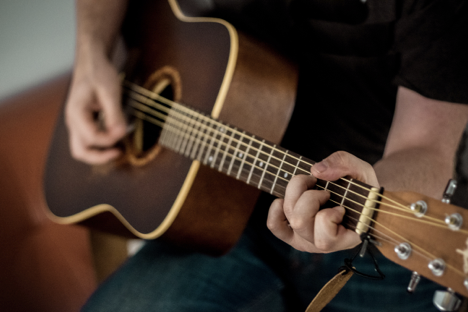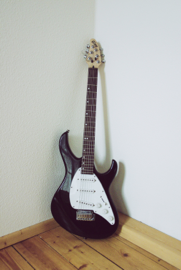Developing Guitar Style
By Chris Glyde

Many people seem to be in the dark as to what exactly is possible with the guitar. I want to take some time here to make sure that we can open your eyes to the possibilities! What you can do on the guitar (and, in reality, any instrument) is quite limitless, and the assumption that all ideas have already been explored is quite misguided.
With any instrument, you have a set of basic skills—visualization, technique, theory, rhythm, and ear training—and, depending on how you combine these skills, you can come up with many different personal abilities for yourself as an instrumentalist.
These skills can also always be taken to another level, meaning that you can always work on improving the efficiency of your right hand a little bit more. You could also always learn more about a particular odd non-diatonic chord. You can even innovate and do something that’s either not been done before, or that you don’t know whether or not has been done before.
 On top of these isolated skills, you can also mix these skills into a million different combinations. You can practice combining specific music theory terms together, mixing the use of secondary dominant chords and some borrowed chords from Phrygian, for example. You can practice sweep picking arpeggios with a combination of bends on specific notes. You can figure out how to make a lick with arpeggios and bends, and then exhaust all of the different ways that this style of lick chord can be used over a single chord progression. You can also master what it sounds like to play a particular chord tone over a 6th chord.
On top of these isolated skills, you can also mix these skills into a million different combinations. You can practice combining specific music theory terms together, mixing the use of secondary dominant chords and some borrowed chords from Phrygian, for example. You can practice sweep picking arpeggios with a combination of bends on specific notes. You can figure out how to make a lick with arpeggios and bends, and then exhaust all of the different ways that this style of lick chord can be used over a single chord progression. You can also master what it sounds like to play a particular chord tone over a 6th chord.
The basic idea is how you can mix and create in infinite patterns in order to add more to your music—and more for you to learn and practice. Each time you mix something together, you create new options and new things for you to learn and master in the future.
Why bring up this subject? Well, many people assume going into music that there is only a finite number of things to learn, or that most innovation has already been done. I was even one of those people growing up.
But the real news is that there is always something new to do, new areas to explore, and something new to learn. If you get started in music, you need to realize that you will never be done learning. Many people will be disheartened by this, but it all depends on how you look at it. If you’re exhausted or overwhelmed by the idea that there will always be something new to learn, you probably practice a lot in an attempt to master music, and don’t do much else. If that’s the case, then I implore you to give yourself a break and do the other things that you love doing. This will give you a new relationship with music and make you more excited about the never-ending learning experience, rather than being discouraged by it.
About the Author:
Chris Glyde is a guitar instructor, vocal instructor in Rochester New York dedicated to raising the bar for guitar education.
